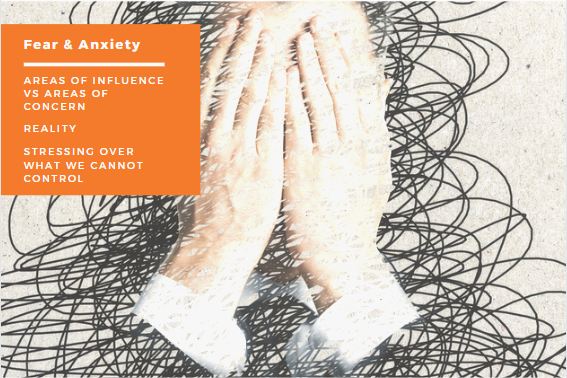Loneliness – Areas of Concern vs. Areas of Influence
Did you know that around 90% of the things we fear will never come to pass? Yet – oftentimes, we spend much of our time stressed about and filled with anxiety over things that we have no control over. This week, we are going to be focusing on things that often cause us stress and anxiety. We are further going to evaluate whether these things are encompassed within our areas of influence, or if they are simply areas of concern.
To get started, by definition, areas of concern are things that often consume our thoughts that we have no ability to do anything to change. Areas of influence on the other hand are things that we are concerned about that we – in contrast – do have a capacity to impact or change in some capacity. For example – I may spend extensive amounts of time concerned about what other people think of me. I have zero control over other peoples’ behavior, let alone what they think. This is an area of concern.
However, I do have control over my own behavior. I can control how I conduct myself – I can be kind, considerate, and intentional about how I interact with others. I cannot control how others will respond, but I do have control over myself. This is an area of influence. Furthermore, I can control how I let other peoples’ behavior affect me. I can control how I respond to the actions of other people.
“For God does not give us a spirit of fear…”
Stressing over things we cannot control
As many of us can relate to – the majority of people spend the majority of their day worrying/stressing about things they have no control over. For example, I may spend most of my day worrying about who the next President of the United States may be. Are there ways in which I can proactively participate in an election? Yes, most definitely. But – giving my time and energy to worrying about this outcome doesn’t directly impact anything. In this scenario, it would be much more productive to focus my energy on the things I can control. I can donate my time and money to causes I care about. I can control who I vote for, I can
actively pray over our country, its leaders and its future. These behaviors that I can control are therefore ultimately a much more productive use of my time. Everything else about this concern – although very valid – classifies as areas of concern rather than areas of direct influence.
Jim Rohn – a prominent author and entrepreneur wrote a whole series about how ‘life is risky.’ Every decision we make – whether we decide to do something or to not do something – involves a level of risk. He once wrote “if you think investing your money is risky, wait until they hand you the bill for not investing.”
Essentially, he is emphasizing that in every situation – whether the decision we are making seems to have high stakes or not – we are taking a risk no matter which side of the coin we end up on. Therefore, the best thing we can do in these situations is to focus on our areas of influence and to make the most disciplined, and logical decision we can in those specific circumstances. This provides sincere insight into the decisions we make on a daily basis. There is risk involved no matter what decision we make. To come back to the previous example – I can control my behavior, but I cannot control how people are going to respond to me.
Will I sometimes make the ‘wrong choice’ in terms of my behavior? Yes, definitely, as is true of any decision we make. Nonetheless, dedicating energy to the outcomes I have no control over continues to not be a productive use of my time, no matter what choice I end up making. This misguided focus would furthermore prevent me from being able to truly see the areas of influence I do have the ability to impact.
In these situations, even when we don’t fully know what decision we are going to make, it can often be helpful to take a step back and reflect on whether the situation we are deliberating over is an area of influence or an area of concern. This is a helpful tool in enabling us to recognize where we can productively allocate our time and energy.
Furthermore, it can sometimes be helpful as well to look at the situation and try to predict what the worst-case scenarios might look like. This is not to establish a sense of fear or hesitation, but oftentimes when thinking about this, we can further than contemplate what it would look like if the worst possible outcome were to occur. Oftentimes, even in what would be considered the ‘worst case scenario’ we can still recognize where we would be able to gradually problem solve and make adaptations to be able to work ourselves out of it. Does this apply to every situation, no definitely not. BUT – in many circumstances – contemplating this can help to give us perspective. This exercise allows us to recognize that even if the worst possible outcome were to happen, in many cases, we would still end up working out ways through which we would end up being alright on the other side.
We might not be able to control the outcome, but whatever the circumstance we are confronting, we can still then deliberately live into the areas of influence that we are presented with. This redirected focus can therefore be yet another helpful tool to decrease anxiety and further enhance a full, productive lifestyle.

